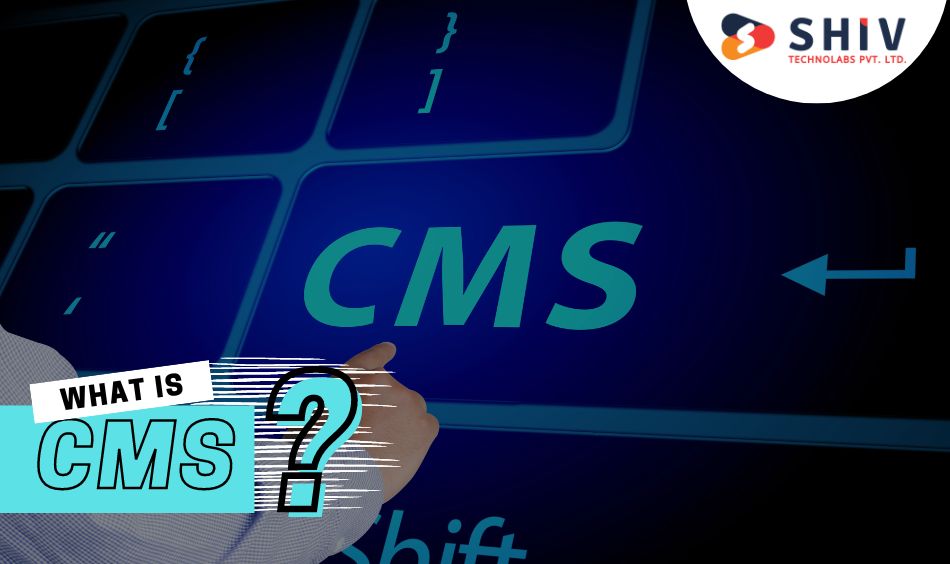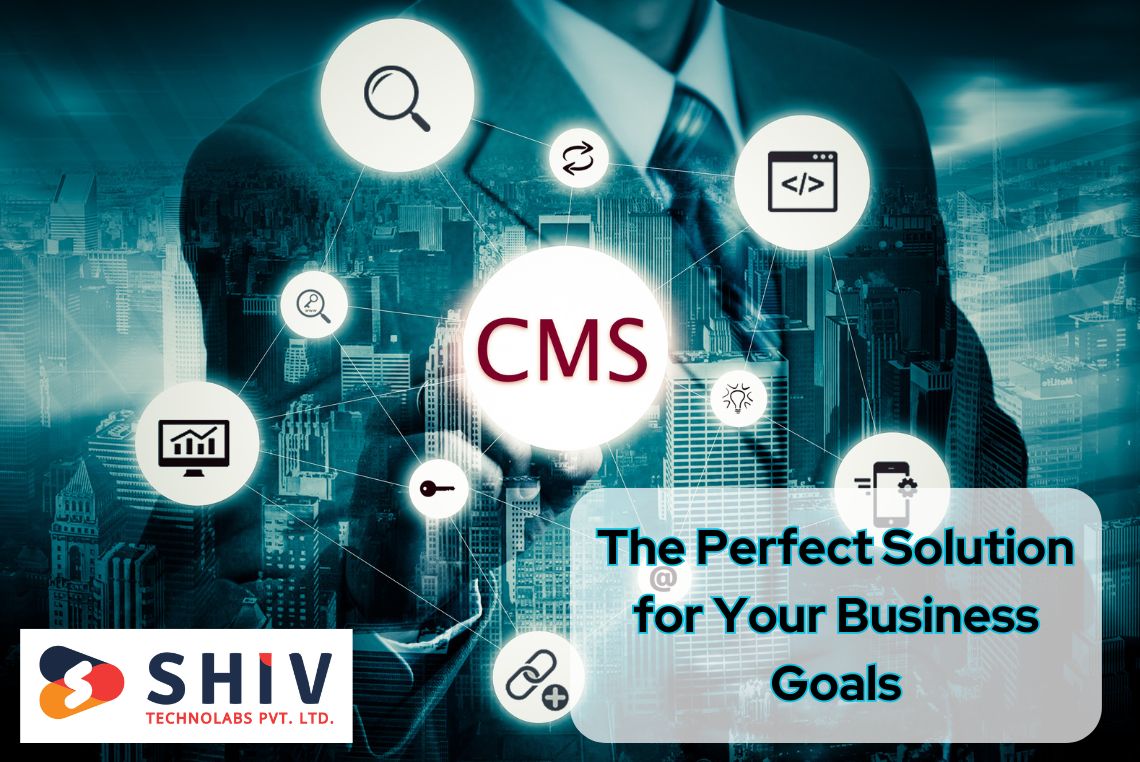Table of Contents
In today’s competitive business environment, maintaining an effective digital presence is crucial. Content Management Systems (CMS) have become essential tools for managing online content efficiently. However, many standard CMS platforms, such as WordPress, Joomla, and Drupal, may not always address the unique needs of every business. This is where custom software development, including custom CMS solutions, can make a significant difference. By creating a CMS that is specifically designed to meet your business’s requirements, you can achieve greater functionality, flexibility, and control over your digital content.
A custom CMS is designed to meet the unique requirements of your organization which offers a solution that meet your specific business needs and growth plans. In this blog, we will explain what a CMS is, why choosing a custom CMS might be beneficial for your business, and the various advantages of opting for a custom-built system over a generic one.
What Is a CMS?

A Content Management System (CMS) is a software application designed to facilitate the creation, management, and modification of digital content. By offering a user-friendly interface, a CMS enables users to manage various types of content without needing specialized technical skills. For businesses, choosing the right CMS can be a key factor in achieving operational efficiency and online success. Exploring how custom software development can increase your business revenue through a bespoke CMS solution highlights the importance of aligning technology with business objectives to drive growth and optimize content management processes.
# Types of CMS:
Traditional CMS: These systems feature a backend for content management and a frontend for content presentation. They are often user-friendly and come with a range of plugins and themes for customization. Popular examples include WordPress and Joomla. Traditional CMSs are typically chosen for their ease of use and wide support community.
Headless CMS: This type of CMS separates the content management from the presentation layer. It stores content in the backend and delivers it to any frontend application through APIs. Headless CMSs like Contentful and Strapi are advantageous for their flexibility and ability to serve content across multiple platforms, including mobile apps and IoT devices.
Hybrid CMS: Combining aspects of both traditional and headless CMSs, hybrid CMS platforms like Kentico and Acquia offer a flexible approach that supports both traditional and API-based content delivery. This hybrid model provides businesses with the ability to manage content effectively while also utilizing modern delivery methods.
# Core Functions of a CMS:
Content Creation: Provides tools and editors to produce content such as articles, blog posts, and multimedia files. It typically includes WYSIWYG (What You See Is What You Get) editors, which simplify the formatting of content without requiring HTML or CSS knowledge.
Content Management: Organizes content into categories, tags, and hierarchies. This structure helps users and search engines find and categorize content efficiently.
Content Publishing: Includes features for scheduling content releases, managing visibility, and controlling who can view or interact with specific content. This functionality is essential for planning content strategies and maintaining an up-to-date website.
User Management: Manages roles and permissions for different users, allowing businesses to control who can create, edit, and publish content. This system supports collaborative work by defining user roles and access levels.
A CMS is indispensable for managing and updating digital content easily, providing a platform that simplifies complex tasks and ensures consistency across your digital channels.
Why Opt for Custom CMS Development?
While off-the-shelf CMS solutions are readily available and often come with numerous built-in features, they may not always align with the specific needs of every business. Here’s why opting for a custom CMS development might be advantageous:
# Custom Features:
A custom CMS allows you to integrate functionalities to your business processes and objectives. For example, if your organization requires specialized reporting tools, custom workflows, or unique data handling capabilities, a bespoke CMS can be designed to include these features from the start.
# Greater Flexibility:
With a custom CMS, you can design a system that adapts to your business’s specific needs. This flexibility extends to the design, functionalities, and integrations, allowing you to modify and scale the system as your business evolves.
# Improved Performance:
A custom CMS can be optimized to handle your particular use case, which may result in better performance compared to standard solutions. This optimization can lead to faster page load times, reduced server load, and an overall more efficient user experience.
# Enhanced Security:
Custom CMS development allows for the incorporation of security features designed to address specific vulnerabilities. This approach can reduce the risk of security breaches compared to generic CMS platforms, which may be targeted due to their widespread usage.
# Better Integration:
A custom CMS can be built to work seamlessly with other systems and tools used by your business. Whether it’s integrating with CRM systems, e-commerce platforms, or third-party APIs, a custom solution ensures that all your tools work together smoothly.
# Unique Branding:
Custom CMS development offers the opportunity to create a design and user experience that aligns perfectly with your brand’s identity. This includes custom templates, layouts, and interactive features that distinguish your website from others.
# Full Ownership:
Investing in a custom CMS gives you complete control over the code and system architecture. This ownership ensures that you can make changes, updates, and enhancements as needed without being dependent on external vendors.
# Scalability:
Custom CMS solutions are built with scalability in mind, allowing for the addition of new features and capabilities as your business grows. This scalability ensures that the system remains effective and relevant over time.
Also read : Transform Your Business with Top 10 Benefits of Custom Software Development
Benefits of Custom CMS Development

Choosing a custom CMS provides a range of benefits that can significantly impact your business’s efficiency and success. Here are some key advantages:
# Personalized User Experience:
A custom CMS allows you to craft a user experience that caters to your audience’s preferences and needs. This includes content recommendations, custom navigation, and user interfaces designed to engage and retain visitors.
# Efficient Content Management:
With a custom CMS, you can create a content management system that matches your specific workflows and processes. This results in more efficient content creation, editing, and publishing, saving time and reducing the likelihood of errors.
# Scalable Solutions:
A custom CMS is designed to grow with your business. It can be adjusted to accommodate new features, handle increased traffic, and integrate with additional tools as your needs evolve.
# Advanced Reporting and Analytics:
Custom CMS solutions can include advanced reporting and analytics tools to your business objectives. This enables you to track performance metrics, understand user behavior, and make informed decisions based on detailed insights.
# Improved Team Collaboration:
Custom CMS systems can feature tools that facilitate better collaboration among team members. This includes features for managing user roles, workflow processes, and real-time editing, enhancing teamwork and productivity.
# Long-Term Viability:
A custom CMS is designed with the future in mind, making it adaptable to technological advancements and evolving business needs. This ensures that the system remains effective and valuable over time.
# Dedicated Support:
When you choose a custom CMS, you often receive dedicated support from the development team who understands your specific system. This specialized support can lead to quicker issue resolution and more effective troubleshooting.
# Cost Efficiency:
Although the initial investment in a custom CMS may be higher than off-the-shelf solutions, the long-term benefits, such as reduced maintenance costs, fewer limitations, and fewer compromises, can make it a cost-effective choice in the long run.
Key Features of a Custom CMS
When investing in a custom CMS, it’s essential to understand the specific features that can be designed to fit your business’s needs. Here are some important features to consider:
# Custom Content Types:
A custom CMS allows for the creation of specialized content types beyond standard blog posts and pages. This could include unique data structures for product listings, case studies, event management, or any other content specific to your business.
# Advanced User Management:
You can implement sophisticated user management features, including customizable user roles and permissions. This means you can control who has access to various parts of the CMS and define what actions different users can perform.
# Flexible Content Editing:
Custom CMS platforms often come with highly adaptable content editors. These editors can be configured to support various content formats and include advanced functionalities like drag-and-drop editing, inline editing, and customizable content fields.
# Customizable Templates and Themes:
You can create and manage custom templates and themes that reflect your brand’s identity. This flexibility ensures that your website’s appearance is unique and can be adjusted to meet changing design trends or business requirements.
# Integrated Analytics and Reporting:
Incorporate advanced analytics and reporting tools that are specifically designed to track the metrics that matter most to your business. This could include custom dashboards, performance reports, and data visualizations.
# Scalable Architecture:
Design the CMS with scalability in mind, allowing for future growth and the addition of new features. This means your CMS can handle increased traffic, additional content, and expanded functionalities as your business evolves.
# Custom Integrations:
A custom CMS can be built to integrate with other systems and software used by your business. Whether it’s integrating with CRM systems, e-commerce platforms, or third-party applications, these integrations help unify your technology ecosystem.
# Enhanced Security Measures:
Implement specific security features to protect against potential threats. This can include custom authentication methods, encryption for sensitive data, and regular security updates to your business’s needs.
# Advanced Search and Filtering:
Develop advanced search and filtering capabilities to help users find content more efficiently. This could involve custom search algorithms, filters, and sorting options based on the unique content types and categories within your CMS.
# Multi-Language Support:
If your business operates in multiple regions, a custom CMS can include multi-language support to manage and display content in different languages, catering to a global audience.
Challenges and Considerations
Opting for a custom CMS development comes with its own set of challenges and considerations. It’s important to be aware of these factors to make informed decisions:
# Development Time and Costs:
Custom CMS development typically requires a larger investment of time and resources compared to using off-the-shelf solutions. Development can be time-consuming, involving detailed planning, design, and testing phases. It’s essential to budget accordingly and account for both initial development and ongoing maintenance costs.
# Complexity:
Building a custom CMS from scratch can introduce complexities that may not be present in pre-built solutions. This complexity includes designing a system that meets all of your requirements, ensuring that it integrates well with other tools, and managing its functionality as it grows.
# Technical Expertise:
Developing a custom CMS requires a high level of technical expertise. You’ll need a skilled development team that understands both the technical aspects and your business requirements. Finding and managing this talent can be a significant undertaking.
# Ongoing Maintenance:
Unlike off-the-shelf solutions that receive regular updates from the vendor, a custom CMS requires ongoing maintenance and updates to ensure it remains secure and functional. This includes fixing bugs, updating features, and adapting to new technologies.
# User Training:
Training your team to use a custom CMS can be more involved than training on a standard platform. Ensuring that users understand how to effectively use and manage the system is crucial for its successful adoption.
# Support and Troubleshooting:
While custom CMS development offers the benefit of support, it also means that troubleshooting issues often falls on the development team that created the system. Establishing a reliable support mechanism is important for addressing any problems that arise.
# Future-Proofing:
A custom CMS needs to be designed with future developments in mind. This means planning for potential changes in technology and business requirements to avoid having to undertake major overhauls down the line.
Is Custom CMS Development Right for Your Business?
Determining whether custom CMS development is the right choice for your business involves evaluating several factors:
# Specific Requirements:
If your business has unique content management needs that cannot be met by standard CMS platforms, a custom CMS may be the ideal solution. This includes specialized workflows, unique content types, or specific integrations that off-the-shelf solutions cannot accommodate.
# Budget and Resources:
Consider whether your organization has the budget and resources to invest in a custom CMS. This includes not only the initial development costs but also ongoing maintenance and support. A custom CMS typically requires a higher investment than standard options.
# Long-Term Goals:
Evaluate how a custom CMS aligns with your long-term business goals. If you anticipate significant growth, require advanced features, or need a system that evolves with your business, a custom CMS could be a good fit.
# Technical Expertise:
Assess whether you have access to the technical expertise needed to develop and manage a custom CMS. This includes having a skilled development team and the ability to provide ongoing support and maintenance.
# Existing Systems:
Determine how a custom CMS will integrate with your existing systems and tools. If you need a solution that works harmoniously with other software, a custom CMS can be built to ensure smooth integration.
# User Experience:
Consider the importance of a unique user experience for your website. A custom CMS can offer a distinctive design and functionality that sets your business apart from competitors, aligning closely with your brand identity.
# Support and Maintenance:
Think about your ability to handle the ongoing support and maintenance of a custom CMS. This includes managing updates, security patches, and troubleshooting issues as they arise.
Conclusion
Choosing the right Content Management System (CMS) is a crucial decision for any business aiming to maintain an effective online presence. While standard CMS platforms offer a range of features, they might not always meet the unique needs of every organization. Custom CMS development presents a valuable alternative, providing a system specifically designed to align with your business’s requirements, goals, and growth plans.
A custom CMS can offer a host of advantages, including specialized features, improved performance, and better integration with existing systems. However, it’s essential to weigh the benefits against potential challenges such as development time, cost, and the need for ongoing maintenance. By carefully considering these factors, you can make an informed decision about whether a custom CMS is the right solution for your business.
If your organization is looking for a solution that offers greater flexibility and specificity than off-the-shelf CMS platforms, custom CMS development might be the answer. It enables you to build a system that supports your unique content management needs and future growth.
For businesses which seeks a personalized approach for content management and custom software solutions, Shiv Technolabs offers expertise in custom software development in USA. Our team specializes in crafting CMS solutions that meet your specific needs and adapt to your business’s evolving requirements. With a focus on quality and customer satisfaction, we provide solutions that drive efficiency and increase your digital operations. Whether you’re looking to develop a unique CMS or need custom software to streamline your processes, Shiv Technolabs is here to deliver innovative solutions that match with your strategic goals. Contact us today to discuss how we can assist you in transforming your digital strategy with a custom CMS solution designed just for you.



















